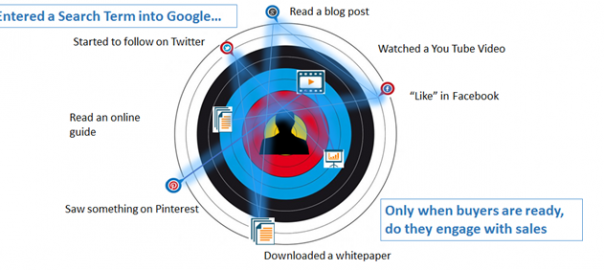As the role of the stereotypical salesperson fades, what will emerge? Columnist Claudine Bianchi sees a blurring of marketing and sales as engagement becomes a priority.
 A lot of surveys and research out there suggest that the days of the salesperson is gone. And you know what? I agree.
A lot of surveys and research out there suggest that the days of the salesperson is gone. And you know what? I agree.
The role of the salesperson we have known is nearing extinction. Many golf courses are already experiencing the impact. Even cigar dealers in Cuba are feeling the pinch.
As marketers, should we cheer? Pop open a bottle of champagne and celebrate the demise of what many marketers feel is the never-ending whining of salespeople who want another data sheet and complain about the quality of leads?
A Rose By Any Other Name…
Yes, the stereotypical hunter-type salesperson is a dying breed. We should all be relieved.
Why? Because this traditional type of salesperson has given all of sales a bad name.
The overly aggressive hunters have made “being in sales” a rather negative career choice; we steer away from these folks at parties and refuse to give them our business cards or phone numbers. We think of them as trying to separate us from our money — tricking us into buying something we either do not want or need.
Many businesses recognize that the perception of “salespeople” is less than positive (on par with “lawyer”). As organizations, we even try to disguise them by calling them anything but salespeople: account executives, business development managers, solutions analysts, consultants, relationship managers…
But sales, as a discipline, is growing and is beginning to increase in stature. We are morphing it into something more palatable to the increasingly sophisticated buyers we have become.
The Buyer’s Journey Is No Longer Linear
Let’s face it — nobody likes to be sold to. And the internet has become the great equalizer, for businesses and for buyers.
Little guys can compete and look just as big as the “big” companies. Buyers can collect information about products from other buyers’ reviews and commentary.
As buyers rely more and more on social media to inform their purchase decisions, the salesperson becomes a later “touch” a consumer has with a brand or product.

The New Buyer’s Journey
No doubt marketing is playing a much bigger role in the first part of the buyer’s journey. Through content marketing, social and other forms of digital marketing, we are more connected than ever to our potential customers. But what about the other parts of their journey?
This is where the “new” breed of salesperson is emerging. Some call it social selling or relationship-based sales. Others refer back to solution selling, and still others refer to it as “challenger sales.”
There are a lot of models and terms referring to this new species of sales. Whatever you call it, there is one thing that is clear: Engagement between the buyer and the seller will be the ultimate factor that determines whether or not a product is sold.
Managing The Conversation, Not The Journey
Salespeople, account managers and customer success folks — they all have to engage in the medium and tone that the buyer is accustomed to. They can’t just send a data sheet or brochure, or even the infamous ROI calculator. They must refer customers to blogs and communities where they can collect insight.
Sales has to understand the customer — their business, their pain points, their motivations for purchasing in the first place. Sales becomes an enabler of engagement, managing the conversation but not the journey.
Sounds a lot like today’s marketer, doesn’t it? And many of my peers believe that the end of sales is near, adding the function to the other responsibilities under the marketing umbrella.
In more and more organizations, marketing is controlling the entire customer experience, from first touch through purchase and beyond.
People Buy From People
Here is where I diverge from some of my peers. I might be a bit old-fashioned here, but I still think people buy from people.
Yes, you may have an e-commerce site and never have a human-to-human interaction with your potential clients. They will make their purchasing decisions solely on the information they find on the internet.
But in the instances where they have more complex problems, where they need help, sales comes into play, starts the conversation and engages. And it is our (marketers’) responsibility to make sure they are equipped to have those conversions in a meaningful and thoughtful way.
Not just to sell, but to solve. Not just to close a deal, but to embark on a journey with that client.
So, is the birth of the new salesperson a blurring of marketing and sales? I hope so — because that’s something I believe we can all celebrate.
Some opinions expressed in this article may be those of a guest author and not necessarily Marketing Land. Staff authors are listed here.
(Some images used under license from Shutterstock.com.)
Marketing Land – Internet Marketing News, Strategies & Tips
(47)








